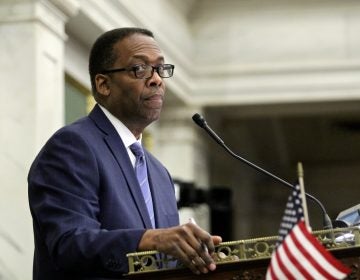North Central landlords’ association formed Improvement District in response to Clarke legislation

In September of last year 5th District Councilman Darrell Clarke introduced a bill into City Council that would have banned student housing in the North Central Special Controls District, the area generally west of Broad Street near Temple University. The bill was referred to Council’s Committee on Rules, but then drew the disapproval of the City Planning Commission and never advanced.
Clarke then talked about getting a ban on student housing in the area inserted into the new zoning code before it passed, again to no avail. Members of the Zoning Code Commission said at that time that such a ban, which effectively calls out a class of people and regulates them separately from everyone else, would be illegal. A similar ban was put in place in Yorktown, east of Broad, in 2004, which permits student housing only in owner-occupied homes. A state court upheld the constitutionality of that law earlier this year.
But despite their failure to move forward, Clarke’s attempts to institute a student-housing ban west of Broad sent landlords in the area a message.
Nick Pizzola, vice president of the Temple Area Property Association (TAPA), a landlord consortium, called Clarke’s September bill “a firing shot across the bow.” He said its immediate effect was to prompt discussions between Clarke and TAPA that led to the formation of the North Central Neighborhood Improvement District, which was the subject of a public hearing before Council’s Rules Committee earlier this week.
The NID would provide extra cleaning and safety services to the North Central neighborhood by imposing a uniform assessment of up to 10 percent on non-owner-occupied properties in the area. In order to be killed, 51 percent of landlords will have to vote against it. The fee would not apply to owner-occupied homes, and owner-occupants will not be able to vote against it.
Both Clarke and TAPA have described the NID as the best way to deal with the influx of students short of banning them in the neighborhood outright. Clarke has been dealing with increasing complaints about Temple-student partying and trash from longtime residents of the area—concurrent with the explosion of multi-family development in the area—over the past several years.
“It’s in our own self-interest to work with the Councilman,” Pizzola said. He said he understood from TAPA’s early conversations with Clarke that, “once the NID is in place, [the bill banning student housing] will be withdrawn.”
It isn’t clear which party first approached the other with the idea of forming an Improvement District. Clarke has said the landlords pitched it to him, and some landlords have said he suggested it to them. But either way, there doesn’t seem to have been much initial opposition—at least among property owners.
“When the Councilman said NID,” said Herb Reid, a TAPA member and North Central NID spokesman, “we were automatically behind him.”
But other TAPA members not involved in the creation of the NID were less enthusiastic about the prospect. Some described feeling as if they had no choice but to go along with it.
“When he tells you to vote,” said Tarik Nasir, a TAPA member who opposes the NID, “it’s not a vote … A vote has no personal consequences.”
The “personal consequences” Nasir alluded to stem from Clarke’s power as a District Councilman to control the flow of development in the 5th District. Clarke himself described that power, known as councilmanic prerogative, in a Daily News op-ed piece last year, briefly excerpted here.
“Supporters of [a specific development] understand that without the Council member’s support, the project could stall,” Clarke wrote. “This brings them to the table. Compromises are reached; legitimate neighborhood concerns are resolved; flawed projects ripen into worthwhile ones; and good projects become superior ones.”
But while Clarke sees this privilege as a force for good planning and compromise, Nasir fears it could be used to intentionally stall projects or block permits from being issued to developers who have personally crossed their Council persons. He said that formally voting against the NID, by signing his name to an opposition form and delivering it to the City Clerk, could be bad for his business in the future.
Another developer who owns about a dozen properties in the neighborhood, and who insisted on remaining anonymous, said he felt property owners were being forced to choose either the NID or the threat of a Yorktown-style ban on student housing.
“It’s a lose-lose,” said the developer.
But many TAPA members and other property owners support the NID—both in terms of its potential to improve the neighborhood generally and to improve their businesses specifically. Though the NID would impose an extra tax on landlords, some feel it will be money well spent when improvements take shape.
“Obviously, everybody is for more cleaning and more lights,” said Dor Berkovitz, who has been developing properties near Temple for the past eight years, “and that’s going to drive the [rent] prices up.”
It’s the prospect of rent prices going up—and of an even greater influx of students, and of non-residents forming a Neighborhood Improvement District—that has caused many longtime community residents to speak out against the bill. Berkovitz said he agrees that, for people who have lived in the neighborhood all their lives and won’t be able to vote against it, the NID proposal is “a little bit not fair.” But he said the product will be better than the process.
“I think everybody will benefit,” Berkovitz said, “including the community.”
But Tarik Nasir, who both owns property and lives in the affected area, said he thinks the NID will largely profit landlords who rent to Temple students.
“Which came first, the cart or the horse?” Nasir said. “Did Darrell Clarke see the Neighborhood Improvement District as a solution to the problem, or was it sold to him as a benefit to someone else, and a solution to the problem? My take on this thing is he’s just a mouthpiece.”
He added, “The students, and the problem they’re creating, is the perfect environment for an investor, because it spreads his opportunity.”
Clarke himself is walking the thin line between encouraging development and representing the interests of some of his constituents who feel their communities are being torn apart. At the Rules Committee hearing, Clarke introduced 17 amendments to the NID bill, which incorporate a number of the community’s concerns. But he is committed to moving the bill forward.
“At the end of the day,” Clarke said, “the individuals who are a part of the designated commercial properties have the vote to support this. If they don’t support it, then it will not happen, regardless of whether or not the community residents are on board.”
Contact the reporter at jaredbrey@gmail.com and follow him on Twitter @jaredbrey
WHYY is your source for fact-based, in-depth journalism and information. As a nonprofit organization, we rely on financial support from readers like you. Please give today.




